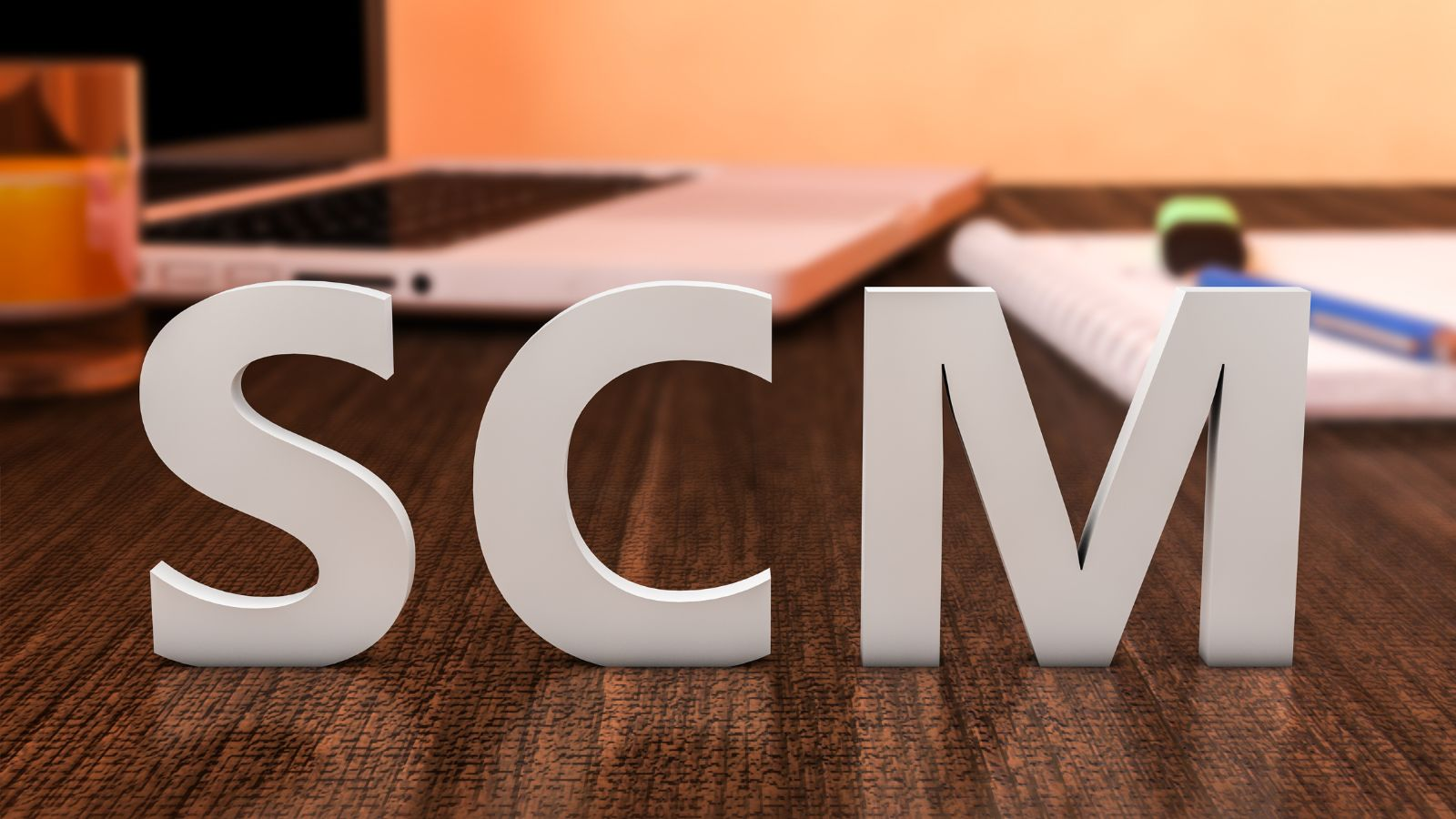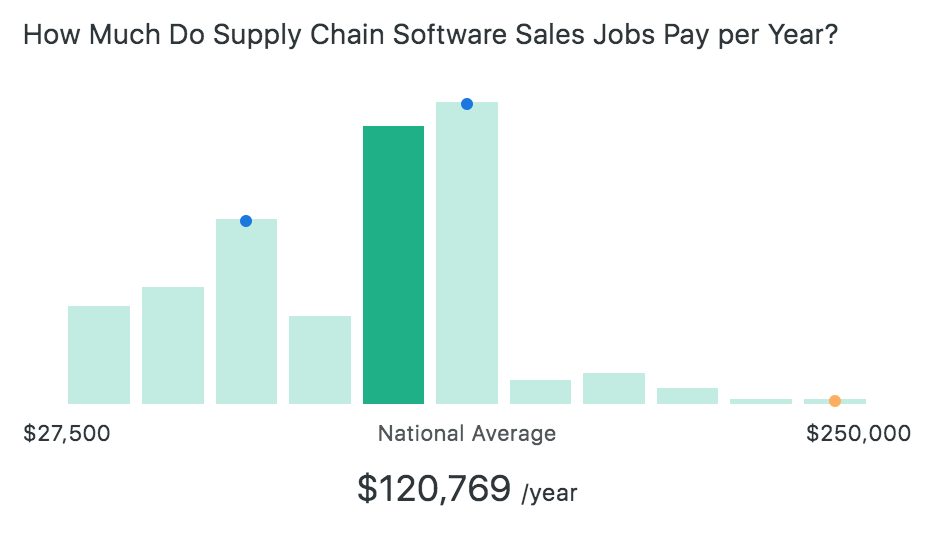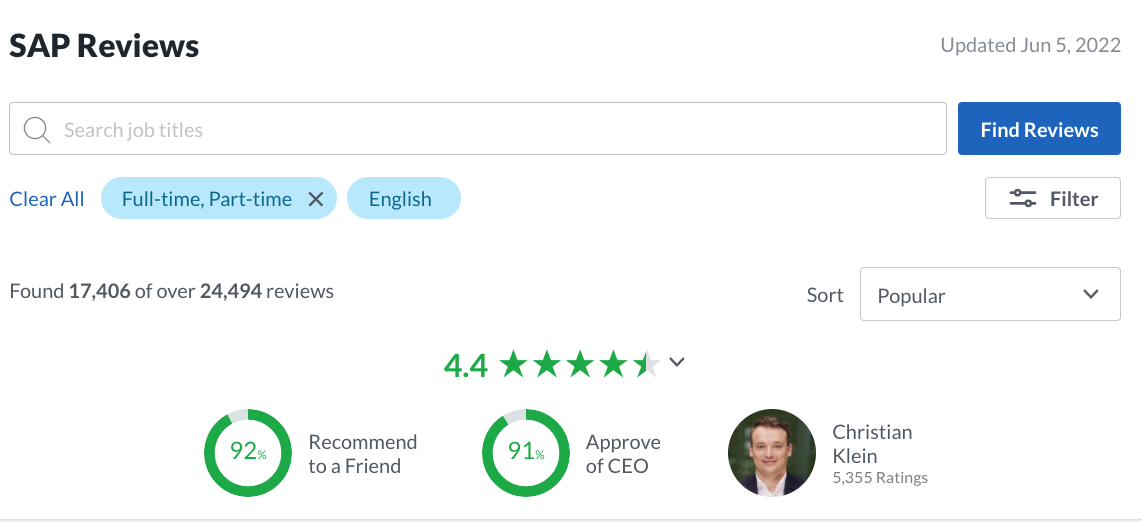 Salespeople in supply chain software sales have high earnings potentials, solid work-life balances, and access to the many perks that come with working in the tech space, from remote work opportunities to a ping pong table made out of legos or something “chill” like that.
Salespeople in supply chain software sales have high earnings potentials, solid work-life balances, and access to the many perks that come with working in the tech space, from remote work opportunities to a ping pong table made out of legos or something “chill” like that.
In this article, we’ll help you decide if this is the right path for you by describing what it’s like to work in supply chain software sales, sharing how much money you can make, and introducing some of the top supply chain management software companies to check out.
First though, what is supply chain software anyway? What exactly will you be selling?
What is Supply Chain Software?
Supply chain management (SCM) software is any software platform or module designed to help businesses manage and streamline their supply chain activities, from executing supply chain transactions to managing relationships with suppliers.
The majority of these software platforms carry the following features:
- Inventory management
- Warehouse management
- Order and billing management
- Supply chain planning and forecasting
- Product lifecycle management
- Logistics and fleet management
Armed with these features, companies can reduce operation costs, limit and predict inventory shortages, and maintain an organized and efficient supply chain management strategy. Supply chain software sales jobs are roles in which a salesperson sells this software to businesses. It can be an extremely lucrative and fulfilling job for the aspiring salesperson.
What it’s Like to Work in Supply Chain Software Sales
Your typical day as a supply chain software sales rep depends on your role within the company. If you’re an entry-level rep, such as a Sales Development Rep (SDR), you will spend most of your time cold calling, emailing, networking, and LinkedIn messaging potential leads who fit your buyer persona in order to book a sales meeting with them.
If you’re an Account Executive, the next step up from SDR, you’ll hold those sales meetings and guide the lead through the discovery phase, demo phase, and closing phases of the sales process. To get a better idea of what it’s like to work in software sales in general, check out our article on the five reasons to become a software salesperson.
In the world of supply chain software, these leads that you’ll be talking with regularly are going to fall into two categories:
- End-Users: These will be the operations people who will actually use supply chain software on a daily basis. They want a tool that makes their lives easier and themselves better at their jobs.
- C-Suite Executives: CFOs know supply chain efficiency can influence cash flow and earnings per share, so they’ll want to evaluate the solution. CEOs and COOs also understand better than anyone the pain that comes with handling unhappy customers. These will be the decision-makers.

In supply chain software sales, you’ll likely have to get both groups involved in the process. Ultimately though, the C-suiters are the ones you need to convince. When with end-users, spend your energy on conducting deep discovery and finding common pain points that you can bring up during conversations with the executives to demonstrate the need for your solution. Save your big presentations and convincing for the c-suite.
Overall, working in supply chain software sales is a difficult yet rewarding, financially and intellectually, career. After a few years serving as an SDR or AE, you’ll have learned a lot about supply chain and business operations, as well as sales, and you can easily take that knowledge to higher-paying sales positions, other software industries, business consulting, or operations at another company.
How to Succeed in Selling Supply Chain Software
Aside from finding and talking with the right people in a company, there are some other tips you can follow to succeed as a supply chain software sales rep:
- Ensure You’re Pitching to Operations People: Avoid setting meetings without an operations expert from the company present. Otherwise, you’re likely wasting your time trying to explain the ROI. “Innovation teams” for example likely won’t understand what you’re talking about.
- Identify and Solve Pain Points: At meetings with the C-suite and operations managers, you need to name persistent issues you’ve found with their supply chain and then need to explain three reasons why your software will solve them.
- Immerse Yourself in Supply Chain Literature: Executives want to work with a vendor who comes across as an expert. So, it’s critical that you study supply chain trends and read up on the technical nature of the business process. Consider grabbing a textbook like “Managing Supply Chain Operations” to learn the ins and outs of your target audience’s job, common challenges, and needs.
- Ask a lot of Questions: Spend a lot of time learning about the business’s supply chain operations and locating their common issues. Asking insightful questions also helps you form a better relationship with the buyer.
Succeeding as a supply chain software sales rep also involves a lot of dedication and hard work. You have to be willing to make the phone calls, ask difficult questions, and challenge your buyers’ beliefs about their current supply chain, thereby throwing light on potential areas they can improve. If you do all this consistently, you can easily bring in over $100,000 per year.
Supply Chain Software Sales Compensation
The average salary for a supply chain software sales rep is $120,769 per year, according to ZipRecruiter’s data.

That’s nearly four times the average salary for sales reps across all industries, and it doesn’t even take into account the commission potential, which, when added, could make a rep’s total earnings double their base salary.
Trends in Supply Chain
Coming across as an expert advisor, rather than just a salesperson, requires that you stay up to date with supply chain trends: the new approaches, best practices, software features, and other details of the ever-evolving landscape.
That way, you can have enlightening and constructive conversations with leads and use your industry knowledge to think up creative ways to solve their supply chain issues.
Below are some of the most impactful trends in the supply chain space:
- Rising Investments in Automation: Supply chain teams are using software to automate the repetitive, time-consuming tasks of supply chain management, thereby freeing up time to focus on strategy and other more impactful initiatives.
- Greater Focus on Sustainability: As society becomes more environmentally bent, companies are trying to make the steps of their supply chain more sustainable. For example, they’re thinking of ways to transport goods in a fuel-efficient manner.
- Increasing Concern About Visibility: Companies want a bird’s eye view of their supply chain and its parts so they can make better decisions. The digitization of the supply chain and access to data is making this easier. With greater transparency comes the ability to spot potential bottlenecks and stop them before they become a problem.
- Growing Personal Relationships: Operations people are becoming more focused on strengthening relationships with their vendors, suppliers, and employees, since they know communication and shared intel are keys to their success.
- Rising Investments in SaaS: Cloud-based SaaS platforms are becoming the go-to for companies that need to manage a supply chain. This is likely what you’ll sell.
- Circular Supply Chains: In the name of sustainability, some companies are trashing the linear supply chain model and implementing a circular one, where discarded products, waste, and raw materials are reintegrated into the manufacturing step.
When you can talk shop with your potential customers, they’re going to be more likely to trust you and, in the end, buy from you.
It’s also a good idea to read up on trends and industry news before applying for jobs in supply chain software sales. That way you’ll know if it’s interesting to you. Interest is important in sales. You can only fake enthusiasm in your team meetings and prospect calls for so long before burning out.
Pro Tip: To see if you’d enjoy selling this type of software, consider heading to a popular supply chain software company’s website and reading through a few of their case studies. When you do this you’ll be able to see if the customer’s problems and the software’s solution are interesting to you.
2 of the Best Supply Chain Software Companies to Work For
Now let’s go over some of the top supply chain software companies out there. These are companies that pay well and are known as good places to work. They’re also usually hiring salespeople, both veteran and entry-level.
Oracle SCM
Oracle is the third-largest software company in the world by revenue and market cap. Alongside many other software products, they offer supply chain management software.
Account Executives at Oracle earn an average of around $100,000 per year, and Senior Sales Consultants bring in an average of around $150,000 annually. These are earnings for salespeople across all their software products, so supply chain software average earnings are probably slightly different.
As a place of work, Oracle receives a 3.9 average rating from over 38,000 reviews from past and current employees. 83% of them approve of the CEO, and two of the main pros listed for working there are “good work-life balance” and “good benefits”.

The best thing about working at a company so well-known is that it will help you get future jobs. Many employers assume you are well-trained if you worked at such a successful company. Plus, you also have the opportunity to switch into different software verticals within Oracle if you get tired of selling their supply chain management software.
SAP SCM
SAP is another giant technology company that sells supply chain management software. It’s known for its use of artificial intelligence and the Internet of Things to give users the visibility they desire.
Account Executives at the company earn an average of about $168,000 per year. And their Senior AEs, a promotion up from regular AE, bring home a tremendous $272,000 per year. For the more technical sales rep, they also have Solution Engineer positions that pay an average of $132,000 per year. Not bad.
And when it comes to treating employees well, they succeed brilliantly, earning themselves an average place of work rating of 4.4. And 92% of employees on Glassdoor say they’d recommend working there to a friend. Once again, employees often cite good benefits and work-life balance as major pros.

Is Supply Chain Software Sales Right for You?
If you find supply chain operations intriguing and want to learn more about the field and the software businesses use to manage it, then this might be the right software sales niche for you. To find jobs, head over to the Sales Trax job board, where we help software salespeople find and land their next SaaS sales job.
If still on the fence, read about some other software sales industries such as recruitment software or fitness software. They may pique your interest.
